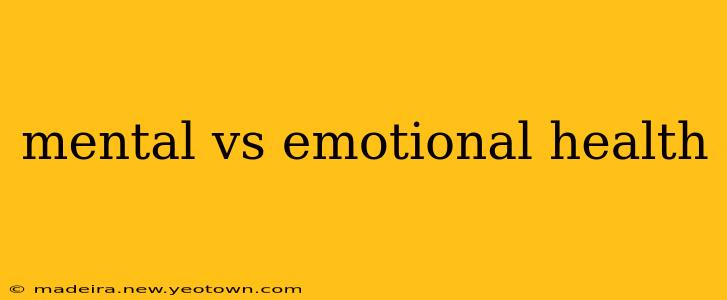It's easy to toss around the terms "mental health" and "emotional health" interchangeably, but they are distinct, though interconnected, aspects of our overall well-being. Imagine them as two sides of the same coin – both crucial for a balanced and fulfilling life. This journey into understanding their differences will unravel the complexities of each, highlighting their unique contributions to our holistic health.
What is Mental Health?
Mental health encompasses the broader landscape of our cognitive functions – our thinking, learning, remembering, and problem-solving abilities. It's about the intricate workings of our minds, impacting how we navigate daily challenges, make decisions, and interact with the world around us. Think of it as the engine room of your being, powering your thoughts and actions. A healthy mind is sharp, adaptable, and resilient, enabling us to cope effectively with stress and bounce back from setbacks.
Imagine a skilled architect designing a magnificent building. The architect’s mental health is like their ability to envision the design, plan the construction meticulously, adapt to unexpected changes during the process and handle the complexities involved. A healthy mental state enables the architect to complete the project successfully. Similarly, good mental health allows us to manage the complexities of life and achieve our goals.
What is Emotional Health?
Emotional health, on the other hand, focuses on our feelings and how we express and manage them. It’s about the spectrum of our internal landscape – our joys, sorrows, anxieties, and excitements. It's the way we experience and process our emotions, impacting our relationships, self-esteem, and overall sense of well-being. It's the vibrant tapestry woven from the threads of our feelings. A healthy emotional state allows for a balanced expression of emotions, enabling us to connect authentically with ourselves and others.
Using our architect analogy again, their emotional health would reflect their ability to handle the pressure of deadlines, the frustration of unexpected problems, and the satisfaction of completing a successful project. Their emotional health influences their interactions with their team, clients, and their overall sense of fulfillment in their work. A healthy emotional state allows for resilience, adaptability, and a positive outlook.
How Are Mental and Emotional Health Related?
Although distinct, mental and emotional health are deeply intertwined. Our emotions can significantly impact our thinking, and vice versa. For example, prolonged sadness (an emotional state) can cloud our judgment and impair our cognitive functions (mental health aspect), making it difficult to concentrate or make decisions. Similarly, negative thought patterns (mental health) can lead to feelings of anxiety or depression (emotional health). They influence each other in a constant feedback loop.
Can you have good mental health but poor emotional health?
Yes, absolutely. Someone could possess excellent cognitive abilities and problem-solving skills (good mental health) but struggle with managing their emotions effectively, leading to difficulties in relationships, impulsive behavior, or emotional outbursts (poor emotional health). This individual might be intellectually sharp but emotionally unstable.
Can you have good emotional health but poor mental health?
This is less common but still possible. Someone might be emotionally well-balanced and manage their feelings effectively, yet struggle with memory, concentration, or other cognitive functions due to a mental health condition like ADHD or a learning disability.
How to improve mental and emotional health?
Improving both mental and emotional health often involves similar strategies:
- Seek professional help: Therapists, counselors, and psychiatrists can offer guidance and support.
- Practice self-care: Prioritize sleep, healthy eating, exercise, and mindfulness practices.
- Build strong social connections: Nurture supportive relationships with family and friends.
- Engage in activities you enjoy: Hobbies and interests provide a sense of accomplishment and joy.
- Develop coping mechanisms: Learn healthy ways to manage stress and difficult emotions.
In Conclusion: The Intertwined Journey of Well-being
Mental and emotional health are inseparable facets of our overall well-being. Understanding their differences, their interconnectedness, and the strategies for cultivating both is key to living a more balanced, fulfilling, and resilient life. Just like a strong building needs a solid foundation and beautiful aesthetics, our lives need the strength of a healthy mind and the vibrancy of healthy emotions. Prioritizing both is an investment in our long-term well-being and a journey towards a more complete and meaningful life.

